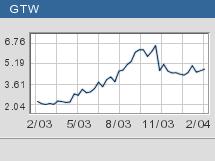
SAN FRANCISCO (CNN/Money) -
Now that the dust has settled after Gateway's surprise announcement that it was acquiring eMachines for about $230 million ($30 million in cash and 50 million shares of stock), it's time for a look at Gateway's latest business model.
In the past I've written about its decision to sell only Gateway (GTW: Research, Estimates) products in its Gateway stores, and then its decision to move headlong into the consumer-electronics space with its plasma televisions and digital cameras. Most of those columns expressed a negative opinion of Gateway's actions, but I'm somewhat optimistic about the eMachines acquisition.

On paper, I think the move positions the company well. However, in the past, Gateway has had a hard time meeting "paper" expectations, and as its oft-evolving strategy attests, its ability to execute is suspect. The success of the Gateway/eMachines union is far from guaranteed, but a couple of factors work in its favor. Let's look at what's behind the move and why it could succeed.
Gateway suffers from two fundamental problems. First, it can't find a way to make money on low-end PCs. Research firm IDC estimates that low-end PCs (sub-$800 by IDC's definition) make up 23 percent of the desktop PC market, up from 14 percent in 2001.
The second problem is that consumers aren't seeing its products much anymore. The company had to cut back on the number of Gateway-branded stores and now needs to find a way to get its PCs and its array of consumer-electronics devices in front of the public.
| Recently in TechBiz
|

|
|
|
|
eMachines addresses both of these issues. It's been profitable for nine straight quarters selling its bare-bones PCs, and it has distribution deals with powerhouse retailers like Costco and Wal-Mart (WMT: Research, Estimates) -- relationships that Gateway hopes to build on to get its products onto shelves.
What's more, by naming eMachines head Wayne Inouye as Gateway's new CEO and kicking founder Ted Waitt upstairs to chairman, the company is finally putting itself in the hands of a leader with serious retail experience (Inouye was with Best Buy (BBY: Research, Estimates) before joining eMachines).
And now, the bad news...
That's the good news. The bad news is that with the eMachines acquisition, Gateway is painting a target on its back for the sharpshooters at Dell (DELL: Research, Estimates) and Hewlett-Packard (HPQ: Research, Estimates).
"[Dell and HP] will only lose share on the low end for so long," says Charlie Wolf, an analyst with Needham & Co. "If eMachines succeeds, they'll initiate a price war, and Dell's and HP's supply chains are better than eMachines's."
A second worrisome point is that Gateway won't necessarily be able to parlay eMachines's successful retail placements into equivalent placements for its consumer-electronics products.
"That's something we need to explore with the retailers themselves," says Bob Sherbin, a Gateway spokesman.
And even if Gateway succeeds in placing those products on retail shelves, its newcomer status (and lack of brand cachet with consumers) means that, in exchange for shelf space, retailers could ask for discounts that would eat into the company's margins. "That's among the issues that we're wrestling with," Sherbin admits.
The X factor in all of this that leans me ever so slightly in favor of the acquisition is Inouye. Here's a man who understands retail and knows how to turn a company around -- two qualities Gateway desperately needs.
With Waitt out of the operational picture, Inouye could finally right the listing Gateway ship. If he is able to return Gateway to something resembling what the company looked like in, say, the late 1990s, with double-digit profit margins, he will immediately catapult himself to the elite echelons of technology CEOs.
Sign up to receive the Tech Biz column by e-mail.
Plus, see more tech commentary and get the latest tech news.

|

